#sara shagufta
Text


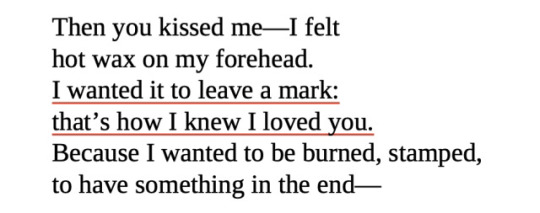






i am the ocean; the earth; whatever dies for you
pedro salinas tr. by ruth katz crispin, the voice I owe to you / patty dickson pieczka, autumn / louise glück, marathon / dulce maría loynaz tr. by james o'connor, absolute solitude / vladimir nabokov, in a letter to his wife véra / c.t. salazar, headless john the baptist hitchhiking / sara shagufta tr. by sascha aurora akhtar, how solitary is the moon / vladimir nabokov, ada, or ardor / alice notley, the black trailer
#web weaving#ww#a kingdom for us#about being hopelessly in love with someone#poetry#pedro salinas#patty dickson pieczka#louise glück#dulce maría loynaz#vladimir nabokov#c.t. salazar#sara shagufta#alice notley#**
1K notes
·
View notes
Text
kaise Tahalta hai chand
kaise Tahaltā hai chāñd āsmān pe
jaise zabt kī pahlī manzil
āvāz ke alāva bhī insān hai
āñkhoñ ko chhū lene kī qīmat pe udaas mat ho
qabr kī sharm abhī baaqī hai
hañsī hamārī maut kī shahādat hai
lahad meñ paidā hone vaale bachche
hamārī maañ aañkh hai
qabr to miTTī kā makr hai
phir parinde sūraj se pahle kisī kā zikr karte haiñ
āvāz ke alāva bhī insān hai
TuuTe ho
zarā aur lahū añgār karo
ki maiñ ek be-libās aurat huuñ
aur jitnī chāhūñ āñkheñ rakhtī huuñ
maiñ ne āvāz ko tarāshā hai
hai koī merā mujassama banāne vaalā
apnī qismat pe udaas mat ho
maut kī sharm abhī baaqī hai
mujhe chādar dene vaale
tujhe hayā tak dukh lag jaa.eñ
mujhe lafz dene vaale
kaash aurat bhī janāze ko kāñdhā de saktī
har qadam zanjīr ma.alūm ho rahā hai aur merā dil tah kar ke rakh diyā
gayā hai shor mujhe lahūluhān kar rahā hai maiñ
apnī qaid kaaT rahī huuñ aur is qaid meñ kabhī
haath kaaT kar pheñk detī huuñ kabhī
āvāz kaaT kaaT kar pheñk rahī huuñ
merā dil daldal meñ rahne vaalā kiiḌā hai aur maiñ qabr se
dhutkārī huī laash
saḌāñdī hī saḌāñd se merī āñkhoñ kā
zā.iqa bad-rūh ho rahā hai
aur maiñ insān kī pahlī aur āḳhirī ġhalatī par dum hilā.e
bhauñktī jā rahī huuñ
maiñ jab insān thī to chor kī aas tak na thī maiñ
āñkhoñ meñ salīb aur dil meñ apnī laash
liye phirtī huuñ
sachchā.iyoñ ke zahr se marī huuñ
lekin duniyā gorkan ko DhūñDhne ga.ī huī hai
vo mujhe ābād kartā hai aur ābād kahtā hai
maiñ harī-bharī pyaas se zarḳhez ho jaatī huuñ
aur phūloñ ko miTTī meñ dabāne lagtī huuñ
dard mere azhdahe kā naam hai
aur saañp kī bhuuk merā ghar hai
Sara Shagufta
2 notes
·
View notes
Text
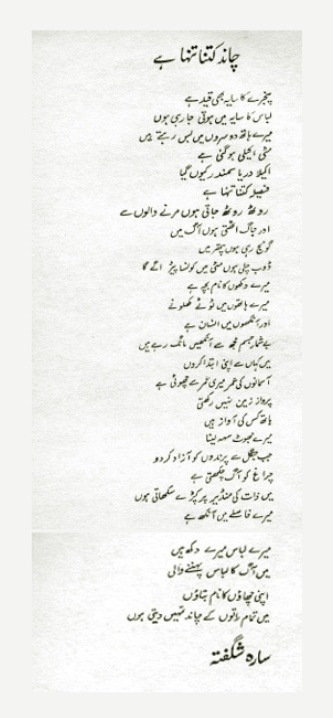

How Solitary Is The Moon, Sara Shagufta
#sara shagufta#poetry#idk i just rly like this one#im trying to read more from SA women and i came across this and i just like it a whole lot#a multitude of bodies are asking me for eyes / i do not know where my own beginning is
111 notes
·
View notes
Text
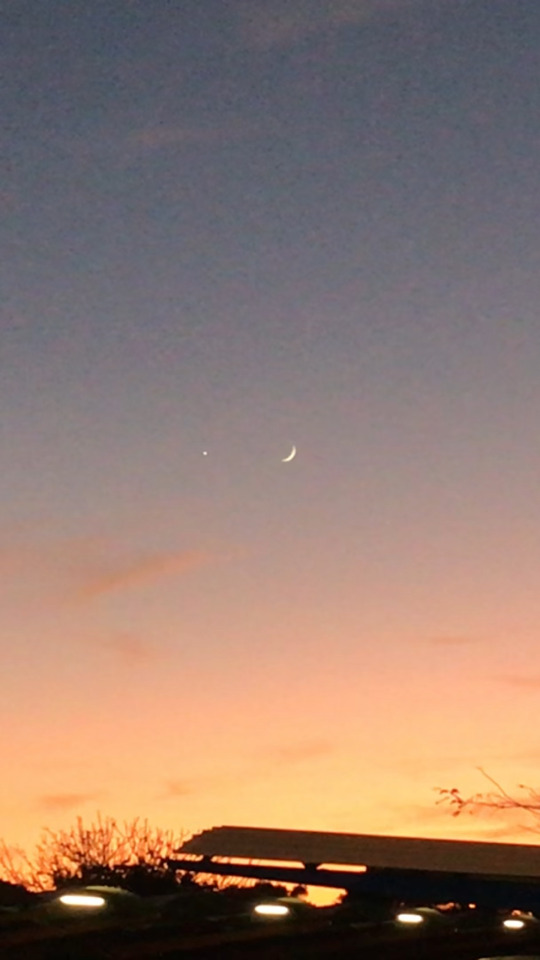
28/11/19 6:21 pm
“To you I give the moons of every single night.”
#moon#poetry#sunset#sara shagufta#shayari#urdu#pakistan#pakistani#pakistani poet#female poet#star#stars#mine#minef
7 notes
·
View notes
Text
سارہ شگُفتہ

سارہ شگفتہ لکھتی ہیں :
ایک شام شاعر صاحب نے کہا مجھے آپ سے ایک ضروری بات کرنی ہے۔ پھر ایک روز ریستوراں میں ملاقات ہوئی۔ اُس نے کہا شادی کرو گی؟ دوسری ملاقات میں شادی طے ہو گئی۔
اَب قاضی کے لئے پیسے نہیں تھے۔ میں نے کہا ۔ آدھی فیس تم قرض لے لو اور آدھی فیس میں قرض لیتی ہوں۔ چونکہ گھر والے شریک نہیں ہوں گے میری طرف کے گواہ بھی لیتے آنا۔
ایک دوست سے میں نے اُدھار کپڑے مانگے اور مقررہ جگہ پر پہنچی اور نکاح ہو گیا۔
قاضی صاحب نے فیس کے علاوہ میٹھائی کا ڈبہ بھی منگوالیا تو ہمارے پاس چھ روپے بچے۔
باقی جھنپڑی پہنچتے پہنچتے ، دو روپے، بچے ۔ میں لالٹین کی روشنی میں گھونگھٹ کاڑھے بیٹھی تھی۔
شاعر نے کہا ، دو روپے ہوں گے، باہر میرے دوست بغیر کرائے کے بیٹھے ہیں۔ میں نے دو روپے دے دئے۔ پھر کہا ! ہمارے ہاں بیوی نوکری نہیں کرتی۔ نوکری سے بھی ہاتھ دھوئے۔
گھر میں روز تعلیم یافتہ شاعر اور نقاد آتے اور ایلیٹ کی طرح بولتے۔ کم از کم میرے خمیر میں علم کی وحشت تو تھی ہی لیکن اس کے باوجود کبھی کبھی بُھوک برداشت نہ ہوتی ۔
روز گھر میں فلسفے پکتے اور ہم منطق کھاتے۔
ایک روز جھونپڑی سے بھی نکال دیئے گئے، یہ بھی پرائی تھی۔ ایک آدھا مکان کرائے پر لے لیا۔ میں چٹائی پر لیٹی دیواریں گِنا کرتی ۔
اور اپنے جہل کا اکثر شکار رہتی۔
مجھے ساتواں مہینہ ہوا۔ درد شدید تھا اور بان کا درد بھی شدید تھا ۔ عِلم کے غرور میں وہ آنکھ جھپکے بغیر چلا گیا۔ جب اور درد شدید ہوا تو مالِک مکان میری چیخیں سُنتی ہوئی آئی اور مجھے ہسپتال چھوڑ آئی ۔ میرے ہاتھ میں درد اور پانچ کڑکڑاتے ہوئے نوٹ تھے۔
تھوڑی دیر کے بع لڑکا پیدا ہوا۔ سردی شدید تھی اور ایک تولیہ بھی بچے کو لپیٹنے کے لئے نہیں تھا۔
ڈاکٹر نے میرے برابر اسٹریچر پر بچے کو لِٹا دیا۔
پانچ منٹ کے لئے بچے نے آنکھیں کھولیںاور کفن کمانے چلا گیا۔
بس ! جب سے میرے جسم میں آنکھیں بھری ہوئی ہیں۔ Sister وارڈ میں مجھے لٹا گئی۔ میں نے Sister سے کہا میں گھر جانا چاہتی ہوں کیونکہ گھر میں کسی کو عِلم نہیں کہ میں کہاں ہوں ۔ اُس نے بے باکی سے مجھے دیکھا اور کہا ، تنہارے جسم میں ویسے بھی زہر پھیلنے کا کا ڈر ہے ۔ تم بستر پر رہو ۔ لیکن اب آرام تو کہیں بھی نہیں تھا۔
میرے پاس مُردہ بچہ اور پانچ رُوپے تھے۔
میں نے Sister سے کہا ، میرے لئے اب مشکل ہے ہسپتال میں رہنا۔ میرے پاس فیس کے پیسے نہیں ہیں میں لے کر آتی ہوں، بھاگوں گی نہیں۔
تمہارے پاس میرا مُردہ بچہ امانت ہے، اور سیڑھیوں سے اُتر گئی۔ مجھے 105 ڈگری بُخار تھا۔ بس پر سوار ہوئی ، گھر پہنچی۔ میرے پستانوں سے دُودھ بہہ رہا تھا ۔میں دودھ گلاس میں بھر کر رکھ دیا ۔ اتنے میں شاعر اور باقی منشی حضرات تشریف لائے ۔ میں نے شاعر سے کہا ، لڑکا پیدا ہوا تھا ، مَر گیا ہے۔
اُس نے سرسری سنا اور نقادوں کو بتایا۔
کمرے میں دو منٹ خاموشی رہی اور تیسرے منٹ گفتگو شروع ہوگئی !
فرائڈ کے بارے میں تمہارا کیا خیال ہے ؟
راں بو کیا کہتا ہے ؟
سعدی نے کیا کہا ہے ؟
اور وارث شاہ بہت بڑا آدمی تھا ۔
یہ باتیں تو روز ہی سُنتی تھی لیکن آج لفظ کُچھ زیادہ ہی سُنائی دے رہے تھے۔ مجھے ایسا لگا !
جیسے یہ سارے بڑے لوگ تھوڑی دیر کے لئے میرے لہو میں رُکے ہوں، اور راں بو اور فرائڈ میرے رحم سے میرا بچہ نوچ رہے ہوں۔ اُس روز علم میرے گھر پہلی بار آیا تھا اور میرے لہُو میں قہقہے لگا رہا تھا ۔ میرے بچے کا جنم دیکھو !!!
چنانچہ ایک گھنٹے کی گفتگو رہی اور خاموشی آنکھ لٹکائے مجھے دیکھتی رہی۔ یہ لوگ عِلم کے نالے عبُور کرتے کمرے سے جُدا ہوگئے۔
میں سیڑھیوں سے ایک چیخ کی طرح اُتری۔ اب میرے ہاتھ میں تین رُوپے تھے ۔ میں ایک دوست کے ہاں پہنچی اور تین سو روپے قرض مانگے ۔ اُس نے دے دیئے ۔ پھر اُس نے دیکھتے ہوئے کہا !
کیا تمہاری طبیعت خراب ہے ؟
میں نے کہا ، بس مجھے ذرا ا بخار ہے ، میں زیادہ دیر رُک نہیں سکتی ۔ پیسے کسی قرض خواہ کو دینے ہیں ، وہ میرا انتظار کر رہا ہوگا۔
ہسپتال پہنچی ۔ بِل 295 روپے بنا۔ اب میرے پاس پھر مُردہ بچہ اور پانچ روپے تھے۔ میں نے ڈاکٹر سے کہا۔
آپ لوگ چندہ اکٹھا کر کے بچے کو کفن دیں، اور اِس کی قبر کہیں بھی بنا دیں۔ میں جارہی ہوں۔
بچے کی اصل قبر تو میرے دل میں بَن چکی تھی۔
میں پھر دوہری چیخ ےک ساتھ سیڑھیوں سے اُتری اور ننگے پیر سڑک پہ دوڑتی ہوئی بس میں سوار ہوئی۔
ڈاکٹر نے سمجھا شاید صدمے کی وجہ سے میں ذہنی توازن کھو بیٹھی ہوں۔ کنڈکٹر نے مجھ سے ٹکٹ نہیں مانگا اور لوگ بھی ایسے ہی دیکھ رہے تھے۔ میں بس سے اُتری، کنڈکٹر کے ہاتھ پر پانچ روپے رکھتے ہوئے ، چل نکلی۔ گھر ؟ گھر!! گھر پہنچی۔
گلاس میں دودھ رکھا ہوا تھا۔
کفن سے بھی زیادہ اُجلا۔
میں نے اپنے دودھ کی قسم کھائی ۔ شعر میں لکھوں گی، شاعری میں کروں گی، میں شاعرہ کہلاؤں گی۔اور دودھ باسی ہونے سے پہلے ہی میں نے ایک نظم لکھ لی تھی، لیکن تیسری بات جھوٹ ہے، میں شاعرہ نہیں ہوں۔ مجھے کوئی شاعرہ نہ کہے۔ شاید میں کبھی اپنے بچے کو کفن دے سکوں۔
آج چاروں طرف سے شاعرہ! شاعرہ! کی آوازیں آتی ہیں، لیکن ابھی تک کفن کے پیسے پُورے نہیں ہوئے۔
_سارا شگفتہ
75 notes
·
View notes
Text
آنکھیں ۔۔۔ سارا شگفتہ
آنکھیں ۔۔۔ سارا شگفتہ
آنکھیں
( سارا شگفتہ )
قسط: 1
برا کیتا ای صاحباں
امرتا پریتم
صاحباں تُو نے بُرا کیا ۔ ۔ ۔ یہ الفاظ مرزا نے تب کہے تھے، جب اُس کی صاحباں نے اُس کا ترکش اُس سے چھُپا کے پیڑ پر رکھ دیا تھا۔ اور آج تڑپ کر یہی الفاظ میں کہہ رہی ہوں۔ جب سارا شگفتہ نے اپنی زندگی کا ترکش جانے آسمان کے کس پیڑ پر رکھ دیا ہے اور خود بھی صاحباں کی طرح مَر گئی ہے اور اپنا مرزا بھی مروا دیا ہے ۔ ہر دوست مرزا ہی تو ہوتا ہے ۔۔۔…
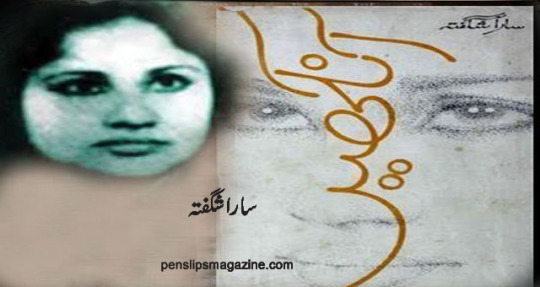
View On WordPress
0 notes
Text
موت کی تلاشی مت لو
بادلوں میں ہی میری تو بارش مر گئی
ابھی ابھی بہت خوش لباس تھا وہ
میری خطا کر بیٹھا
کوئی جائے تو چلی جاؤں
کوئی آئے تو رخصت ہو جاؤں
میرے ہاتھوں میں کوئی دل مر گیا ہے
موت کی تلاشی مت لو
انسان سے پہلے موت زندہ تھی
ٹوٹنے والے زمین پر رہ گئے
میں پیڑ سے گرا سایہ ہوں
آواز سے پہلے گھٹ نہیں سکتی
میری آنکھوں میں کوئی دل مر گیا ہے۔۔۔
سارا شگفتہ
3 notes
·
View notes
Text
میں تمام راتوں کے چاند تمھیں دیتی ہوں
To you I give the moons of every single night
- Sara Shagufta.
#urdu poetry#urdu poems#urdu literature#poets on tumblr#spilled poetry#pakistani literature#call me yellow
314 notes
·
View notes
Text
Ai mere sar-sabz Khuda, khizan ke mausam men bhi maine tujhe yaad kiya
O my ever fertile God, even in my dreary season of autumn have I kept my remembrance of You.
Sara Shagufta (a Pakistani poetess who died at a young age of 29 by throwing herself in front of a running train)
38 notes
·
View notes
Quote
I do not know where my own beginning is
Sara Shagufta (1954 – 1984), from “How Solitary Is The Moon”, translated from Urdu by Sascha Aurora Akhtar
50 notes
·
View notes
Quote
How solitary the act of choice.
Sara Shagufta (Pakistan, 1954 – 1984), from “How Solitary Is The Moon”, translated from Urdu by Sascha Aurora Akhtar
76 notes
·
View notes
Text
Sri Lanka urged not to violate fundamental rights in the name of combating terror
We the undersigned, who are from and live in the various nation-states of South Asia, express our deepest condolences to all those who have lost loved ones in the serial bomb blasts in Sri Lanka on Easter Sunday. We express our solidarity with those working tirelessly to address the needs of the injured in the aftermath of this carnage and to sustain interfaith and community relationships.
While we support all justice efforts that seek to hold the perpetrators of violence accountable, we also urge the Government of Sri Lanka to ensure that, in the name of combating terror and ensuring national security, fundamental human rights and dignity of all concerned are not violated.
We say this because in all our countries, investigations into terror and anti-terror legislation have been accompanied by consistent and continuing violation of civil and democratic rights. Furthermore, in the name of ensuring national security, successive governments in the region have sought to legitimise their various acts of impunity – directed against not only purported or possible suspects but entire sections of the civilian population. This has led to unaccountable loss of life and a steady erosion of democratic guarantees and institutions, including unaccounted for deaths and disappearances.
We note with concern that media reports and remarks by state officials and political leaders in Sri Lanka have pointed to State inaction with respect to warnings by intelligence agencies about possible acts of terror. Such inaction and indifference, we regret to note, amounts to State complicity with the violence that subsequently unfolded.We are also concerned that the ‘owning up’ to these acts by the so-called ‘Islamic State’ (Daesh) might encourage Islamophobic attitudes and expressions, both on the part of the Sri Lankan Government and sections of civil society. Should this happen, Sri Lanka would be tragically drawn in to a familiar international discourse and practice to do with ‘Islamic terror’ with all the resultant tragedies, as we have witnessed across Asia. In a country that has barely recovered from decades of civil mistrust, war and violence, this cannot bode well for its sovereignty, civil peace and economic and social life.
We wish to point out that the so-called war on ‘Islamic terror’ has resulted in large numbers of the Islamic faith being persecuted, both in their countries and across the world – and this sadly only enhances the appeal of those who seek to wage war in the name of Islam and what they perceive as Islamic concerns and interests. Thus is set in motion a cycle of violence that benefits no one but the arms trade and industries, and political powers that seek to establish their hegemony in the region at all costs.
In this context:
nWe support all struggles to ensure transparent and fair pursuit of justice for the victims of the blast. At the same time, we stand with those who are against undemocratic anti-terror laws in Sri Lanka, even if they are purportedly deployed for purposes of investigation and national security.
nWe protest attempts to target or persecute those of the Islamic faith, in the name of countering terror, whether by the state or vigilante groups.
nWe support Muslim communities in the region that have called for peace and are critical of voices from within that endorse extremist religious positions, which polarise everyday life and interactions, and vitiate meaningful dissent and dialogue.
nWe affirm the resilience of diverse cultural and religious traditions in the region that have fostered longstanding habits of mutuality, trust and co-existence. We do not wish for the specificity of local beliefs and traditions, of all faiths, to be drawn into polarising global discourses of religious ‘unity’ and ‘singularity’ imposed from above.
List of signatories:
Afghanistan
Massihullah, Kabul Afghanistan
Sima Samar, Afghanistan
Nepal
Anju Kandel, Nepal
Deepa Gurung, Nepal
Hari Sharma, Kathmandu, Nepal
Kaalo.101, Nepal
Kanak Mani Dixit, Kathmandu
Kunda Dixit, Kathmandu, Nepal
NayanTara Gurung Kakshapati, Kathmandu, Nepal
Niranjan Kunwar, Kathmandu, Nepal
Sarita K.C, Nepal
India
Mangai, India
Abha Bhaiya, India
Abirami Jotheeswaran, India
Amar Kanwar, New Delhi, India
Anuradha Bhasin, Kashmir Times, India
Anuradha Kapoor, India
Arundathi V, India
Ashish kumar Dey, India
Bindu Doddahatti, India
Deepti Sharma, New Delhi, India
Dia Da Costa, India
Dipta Bhog, India
Farida Khan, India
Forum Against Oppression of Women, India
Geetha V, India
Huma Ahmed-Ghosh, India
Indu Vashist, India/Canada
Iram Saeed, India
Jinee Lokaneeta, India/USA
K, Lalita, India
Kamla Bhasin, India
Khalida Saleem, India
Madhu Mehra, India
Mamta Singh, Women Right Activist, India
Mary John, India
Maya Sharma Vikalp (Women’s Group), India
Meena Gopal, India
Meera Velayudhan, India
Mohan Rao, India
Mrinalini R, India
Nandini Manjrekar, India
Nandita Shah, India
Nastasia Paul Gera, India
Neelanjana Mukhia, India
Neeraj Malik, India
Nupur Basu, India
Pam Philipose, India
Panchali Ray, New Delhi, India
Ponni Arasu, India
Poonam Batra, India
Prathama Raghavan, Hyderabad, India
Rafiul Alom Rahman, India
Ramakant Agnohotri, India
Rita Manchanda, India
Ritu Dewan, India
Ritu Menon, India
Roshmi Goswami, India
Sabeena Gadihoke, India
Sahba Hussain, India
Saheli Women’s Resource Centre, New Delhi, India
Sameera Iyengar, India
Sara Abraham, India
Shohini Ghosh, India
Shrimoyee N, Ghosh, India
Snigdha Chakraborty, India
Sujata Patel, India
Svati Shah, India/USA
Swarna Rajagopalan, India
Tanvi Mishra, New Delhi, India
The Queer Muslim Project, India
Uma Chakravarty, India
Vanita Nayak Mukherjee, India
Veena Shatrughna, India
Mamatha Karollil, India
Afshana Bano, India
Supriya Madangarli, India
Pakistan
Abeera Tanveer, Pakistan
Ailya Khan, Pakistan
Ajwah Nadeem, Pakistan
Aminah Waheed Chaudhry, Pakistan
Ammar Ali Jan, Pakistan
Amna Durrani, Pakistan
Amna Iqbal, Pakistan
Amna Mawaz, Pakistan
Anis Haroon, Pakistan
Anoosha Shaigan, Pakistan
Arooj Aurangzeb, Pakistan
Asma Malik, Pakistan
Awami Workers Party, Punjab
Ayra Indrias, Pakistan
Baila Anjum, Lahore, Pakistan
Basmina, Pakistan-Afghan Border
Beena Sarwar, Pakistan
Beenish Muhammad Ali, Pakistan
Bonnie Mende
Candas Anjum, Pakistan
Qasim Iqbal, NAZ Pakistan
Faiz Younas, Pakistan
Farida Batool, Pakistan
Farida Shaheed, Pakistan
Fatema Bhaiji, Pakistan
Fatima A. Athar, Pakistan
Fatima Butt, Pakistan
FemSoc at LUMS, Pakistan
Feroza Batool, Pakistan
Fiza Khatri, Pakistan
Furhan Hussain, Pakistan
Ghausia Rashid Salam, Pakistan
Ghazala Anwar, Pakistan
Gwendolyn S. Kirk, USA/Pakistan
Hadi Hussain, Pakistan
Hameeda Hossain, Pakistan
Have Only Positive Expectations – HOPE, Pakistan
Hiba Akbar, Pakistan
Hira Mohmand, Pakistan-Afghan Border
Huma Fouladi, Pakistan
Huma Majeed, Pakistan
Humraz society, Karachi, Pakistan
Jamaima Afridi, Pakistan-Afghan Border
Jawad Anwar, Pakistan
Kashmala Dilawar, Pakistan-Afghan Border
Khawar Mumtaz, Pakistan
Khushbakht Memon, Pakistan
Kishwar Sultana, Pakistan
Kyla Pasha, Pakistan
Lubna Chaudhry
Madiha Latif, Pakistan
Maheen Asif Khan, Pakistan
Malik Moeed, Pakistan
Manal Yousuf, Pakistan
Mani AQ, Pakistan
Maria Rashid, Pakistan
Maryam Hussain, Pakistan
Maryum Orakzai, Pakistan-Afghan Border
Masooma Fatima, Pakistan
Mehlab Jameel, Pakistan
Melanie D’souza, Pakistan
Momina Jahan, Pakistan
Momina Pasha, Pakistan
Muaaz Ali, Pakistan
Naazish Ata-Ullah, Pakistan
Nabiha Meher Shaikh, Pakistan
Nageen Hyat, Pakistan
Naheed Aziz, Pakistan
Naila Naz, Pakistan
Nasim Begum, Pakistan-Afghan Border
Nasreen Rahman, Pakistan
Neelam Hussain, Pakistan
Nighat Dad, Pakistan
Nighat Said Khan, Pakistan
Nimra Akram, Pakistan
Noreen Naseer Pakistan
O Collective, Pakistan
Omer Arshad, Pakistan
Outcast Magazine, Pakistan
Palvashay Sethi, Pakistan
Queer Karachi, Pakistan
Quratulain Faraz, Pakistan
Rafia Asim, Pakistan
Rahma Muhammad Mian, Karachi
Roohi Khan, Pakistan
Rubina Saigol, Pakistan
Rukhsana Rashid, Pakistan
Saadia Haq, Pakistan
Saadia Toor, USA/Pakistan
Saba Gul Khattak, Pakistan-Afghan Border
Sabeen Andleeb, Pakistan
Sadaf Aziz, Pakistan
Sadia Afridi, Pakistan-Afghan Border
Sadia Khatri, Karachi, Pakistan
Saima Jasam, Pakistan
Saima Munir, Pakistan
Saleha Rauf, Pakistan
Saman Rizvi, Pakistan
Samavia Malik, Pakistan
Samina Orakzai, Pakistan
Samina Orakzai, Pakistan-Afghan Border
Sana Naeem, Pakistan
Sarah Humayun, Pakistan
Sarah Suhail, Pakistan
Sarah Zaman, Pakistan
Sehrish Tariq, Pakistan
Shafeeq Gigyani, Peshawar Pakistan
Shagufta Rehmat, Pakistan
Shazia Shaheen, Pakistan
Shirkat Gah – Women’s Resource Centre, Pakistan
Shmyla Khan, Pakistan
Shumaila Kausar, Pakistan
Shumaila Shahani, Pakistan
Syed Raza Haider, Pakistan
Tabitha Spence, Pakistan
Tahira Kaleem, Peshawar, Pakistan
Tehreem Azeem, Pakistan
The Enlight Lab, Pakistan
Wafa Asher, Pakistan
Women’s Action Forum, Pakistan
Yusra, Pakistan-Afghan Border
Zahra Durrani, Pakistan
Zakia Majid, Pakistan
Zeenat Afridi, Pakistan – Afghan Border
Zeenia Shaukat, Pakistan
Zehra Keshf, Pakistan
Ambreen Ahmad, Pakistan
Bangladesh
Amena Mohsin, Dhaka Bangladesh
Anusheh Anadil, Dhaka, Bangladesh
Arup Rahee, Dhaka, Bangladesh
Adilur Rahman Khan, Dhaka, Bangladesh
Dr Asif Nazrul, Dhaka, Bangladesh
Dr Hameeda Hossain, Dhaka, Bangladesh
Dr Ridwanul Hoque, Dhaka, Bangladesh
Dr Zafrullah Chowdhury, Dhaka, Bangladesh
Faustina Pereira, Dhaka, Bangladesh
Shahidul Alam, Dhaka, Bangladesh
Shahnaz Huda, Dhaka, Bangladesh
Fahmidul Haq, Dhaka, Bangladesh
Firdous Azim, Dhaka, Bangladesh
Galiba Rabbani, Bangladesh
Gitiara Nasreen, Dhaka, Bangladesh
Hana Shams Ahmed, Bangladesh/Canada
Inclusive Bangladesh, Bangladesh
Khushi Kabir, Bangladesh
Nur Khan, Dhaka, Bangladesh
Meghna Guhathakurta, Dhaka, Bangladesh
Mirza Taslima Sultana, Dhaka, Bangladesh
Mohammad Tanzimuddin Khan, Dhaka, Bangladesh
Mohammed Iqbal Hossaion, Bangladesh
Monika Biswas, Bangladesh
Perween Hasan, Dhaka, Bangladesh
Rahnuma Ahmed, Dhaka, Bangladesh
Reetu Sattar, Dhaka, Bangladesh
Rezaur Rahman Lenin, Dhaka, Bangladesh
Rina Roy, Dhaka, Bangladesh
Selima Sara Kabir, Bangladesh
Shaheen Anam, Bangladesh
Shamsul Huda, Bangladesh
Sharnila Nuzhat Kabir, Bangladesh
Shireen P Huq, Dhaka, Bangladesh
Sultana Kamal, Dhaka, Bangladesh
Zareen Mahmud Hosein, Bangladesh
Others
Aurangzaib Alizai, Thailand
Kumkum Dey, New Jersey
Rumah Pelangi Indonesia
0 notes
Text
The light
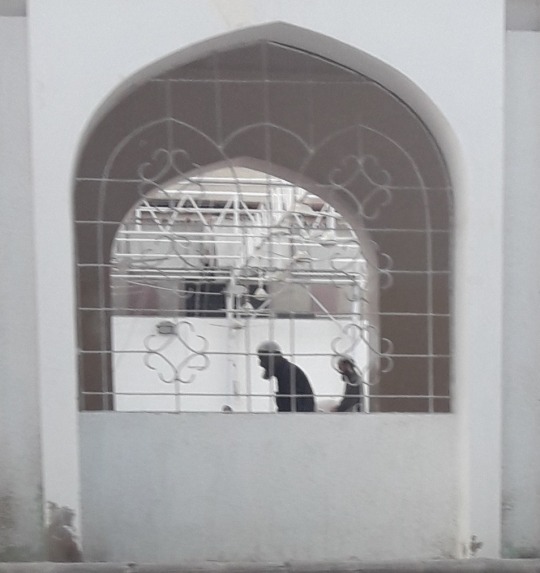
Dear Diary,
My grandmother has seen the face of God. Or so she says. She tells us how she was praying one night and heard a bird against the window. She saw its moving shadows against the wall in front of her, its silhouette against the frame, her head bowed in supplication. She glanced upwards slowly and the bird flew away. As she recited the last few verses, her eyes were fixed towards the window. It happened by chance, she tells me, she was drawing the muslin scarf closer and a bright light filled the sky for an instant.
“That is not a face that is a light.” My sister snorts, turning towards the rest of the crowd. My grandmother wacks the back of her head and berates her for being disrespectful. “The light is God’s face. The light is how He manifests himself to us!” She barks and we duck our heads.
We are standing outside a mosque buying fruit while my dad prays inside. The fruit vendor stands under a palm tree, the shadows of its leaves are etched against the white of the mosque. The sun is high in the sky, bearing down at him as he measures out oranges and guavas for us. Dad’s sudden religiosity after his heart attack has brought us to him many times. He has seen the face of God, too, apparently.
I sit out there in the car and wonder why I haven’t. As I stare at the stark whiteness of the walls, I realize I have never been inside a mosque either. The doorway is packed with men rushing into pray, their slippers laying across the steps below. They file in, and I see a glimpse of the rows of men across a vast marble floor bowing down together. I watch them go in, watch them leave me behind.
26th March 2017
It is 3 o’clock in the afternoon and I am in a small mosque for women. I sit on a bamboo mat on the floor, legs crossed, my tablet on my lap. I pretend to read the Quran, but really I am reading poetry. Sara Shagufta, Kishwar Naheed, Fahmida Riaz, Nidaa Khowry, Ishrat Afreen, Fatima Naoot. There are three other women besides me here so I keep my eyes downcast and a scarf above my head. The walls are stark, a filtered light fills the room through a large window in the eastern corner, prayer mats are kept on shelves across from me.
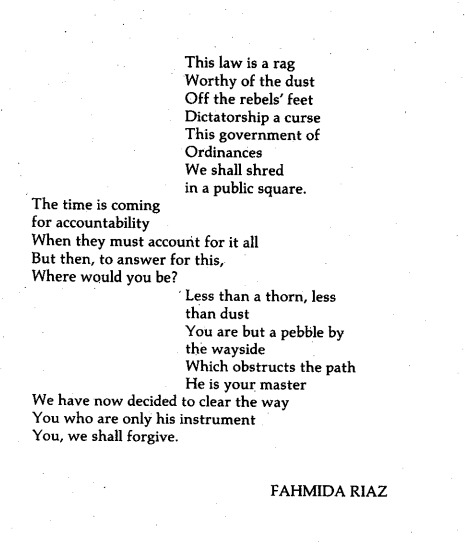
It is slightly thrilling to be here, I feel like a rebel, although I am not sure what I am rebelling against. Gender norms? It’s a known fact that boys go to mosques and girls pray at home here, that the public gatherings for a Muslim brotherhood, is exactly for that a Muslim brotherhood, that access to public spaces, to public rituals of worship is cut off to gendered bodies that do not embody masculinity. Over the years, anytime my parents would praise the collectivism in Islam, I’d point out this flaw, that the collectivity formed excluded certain gendered bodies, women most of the time and gender non-conforming individuals all of the time. Perhaps I am rebelling here because I am reading poetry, the verses that allow me to gain peace and transcend the mendacity of life, that hold answer, that can provide a spiritual connection, a communication with someone. Perhaps it is because I am an atheist and a woman in a mosque and I am reading an anthology entitled “We sinful women.”

It is peaceful here, that much is clear, but the purpose for which it was made is not something I am interested in. I have not prayed and a burkha-clad lady has been eying me suspiciously for it. Funny, I always thought my atheism was an invisible form of marginality, one that could be hidden from a public that equated atheism with apostasy and was heavily punished, sometimes even with families disowning you and even execution. Here, it is conspicuous, my behavior, my not praying is signaling a transgression. I suppose ordinary transgressions do tip people off of my religious beliefs. In a land where practically everyone prays five times a day, I don’t do so. My uncovered head and jeans signal a transgression of a gendered moral order, derived from certain interpretations of religion and imposed on to an entire population. My jeans with their legs splattered with paint are particularly subversive, because art here is disapproved of, because drawing/painting/sculpting faces is not allowed, that it is too close to idolatry, or so I’m told.
But there is something satisfactory about this, to gain peace in my own way in a place where I should not be welcome that symbolizes a system of oppression that has inscribed itself onto me. In the global North, in the Muslim Diaspora I suppose religion becomes a reason for oppression, but here it is a source. It is a source of violence, coercion. It is on the basis of religion that most moral policing occurs. Which is why it’s so hard to be sympathetic to the “Reluctant Fundamentalist” or its kin, that espouse a narrative of simply oppression on the basis of religion, that lionize religion’s role in identity when religion as an institution becomes an oppressive force for our identity, that cordons us off to the realm of silence.
I don’t believe in God, but I have to pretend I do. The truth cannot be spoken. I was chastised for being shameless when I confessed to my aunt I did not find peace through prayer. When I told my therapist I was an atheist, she said that I should pray and my depression would go away. I don’t believe in God, but I have to pretend I do. I have to pray and fast and say all the right things at the right times, say hello according to the religious way, say a prayer when walking across a graveyard, say Insha’Allah (May God will it) when I am talking about the future.. When can I find a language of my own?
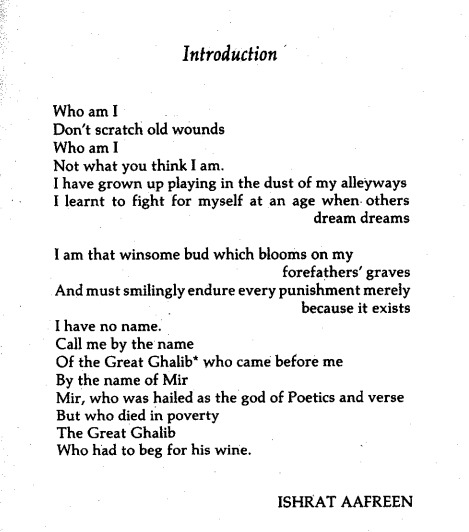
I try to find it, through these poets. These poets who criticize Islamic dogma, who criticize the male-dominated discourse it has become. I try to find the beauty in their ideas, in their re-writing of religion. I stare at a blank spot on a screen, trying to will Sara Shagufta lost Quran back into existence. It was a re-writing of the Quran, for women, including them into the narrative. A friend of mine has explored the idea of God as feminine, writing back through history to get to the Quran’s heart. I wonder if I do what they did, will I see god’s light.
Later, I sit with grandmother. She has finished praying and sits with prayer beads in her hands. Her gaze is fixed on the window that showed her the face of God. I once asked her why she uses the beads, rolls them one at a time. She told me they connect her to God, and let her look back on her life to thank him, that she counts back the years through them, whispering thanks for each.
She twirls the prayer-beads through her fingers. They have shrunken with age, lined, feeble as if they will disappear soon. They are nestled against the muslin of her dress. The beads are turquoise; she rolls one after the other as she speaks her eyes far away. They are made of feroza, they conjure the past into being, your fingers rolling over memories, carrying grief and love.
-H.
0 notes
Text
میں ست قبری ۔۔۔ سارا شگفتہ
میں ست قبری ۔۔۔ سارا شگفتہ
میں ست قبری
۔سارا شگفتہ
اوہنے روٹیاں چرائیاں
مینوں بُھکھ نہ لگی
اوہنےتریہہ اکٹھی کیتی تے میرے بھانڈے ٹُٹ گئے
اوہنے میرے لئی دھڑکن لبھی
جدوں میرے ساہ پتھر ہوگئے
اوہنے شاخ توڑی تے بانسری بنائی
اوہنوں گھڑدیاں میری انگلی ٹُٹ گئی
جیہڑا چور پھڑدی اوہ یار نکلدا
انتظار کھولے رہ گیا تے اکھ اوہدے گھر’
میں گھروڑی
تے روز اوہدی اک ٹوٹ میرے تے ڈگدی
تے میں اپنے ہنیریاں توں اکھاں چُک لیاں
اوہدے لفظ دُدھ پی گئے…
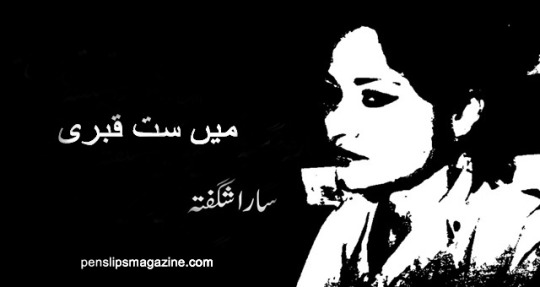
View On WordPress
0 notes